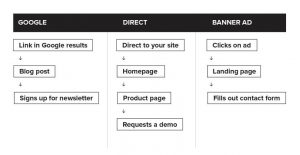
In the world of business, clutter is everywhere. It’s in the email inbox with hundreds of unread messages. It’s in the boxes and drawers piled up overflowing with bits of paper. It’s in the endless meetings, the time spent looking for a pen that works, the meaningless objectives. Living in such chaos at work is bound to have a detrimental impact on the abilities of those beset by the clutter.
Clutter has been proven to have a negative impact on your brain’s ability to function properly. If you want to be able to work efficiently and effectively, you need to learn how to scale the mountains of paper and possessions, and work out how streamline your digital environment.
One of the biggest culprits when it comes to clutter in a business environment is organisational complexity. This could mean overabundance of management tiers, siloed information which is not shared meaning that it has to be gathered repeatedly and needlessly, or too many corporate objectives.
Meetings are also a type of clutter – particularly meaningless ones. A recent study has show that within large firms, managers spend 15% of their time in meetings, a figure which increases every year. A lot of these meetings aren’t important, taking up valuable time which could be spent on something more constructive. The higher up in a company you go, the worse it gets. Senior people in companies are in meetings two days a week with more than three people attending. Can some of this be done via email instead?
Ensuring that a company works to try and simplify is important. Obviously companies form because the work needs to be shared and the people need to be specialised. But some companies let staff call meetings to an end that are becoming derailed. Limiting meetings to 30 minutes can also mean that people get what they want to say out quickly and then put into practice what has been discussed.
It’s not just the more metaphysical and bureaucratic clutter that can start to swamp a business; physical clutter could be impeding your company’s growth too. If you can’t find important paperwork or files, then time is wasted as people are forced to hunt instead of working. Clutter is distracting.
To manage clutter in your business, create a culture of simplification.
- Short meetings only.
- Dedicate time each day to clearing inboxes.
- Use cloud storage to keep paper files out of the office
- Make sure that people tidy as they go.
- Create strict deadlines and stick to them.
- Have a spring clean with all employees so that everyone is encouraged to declutter.
- Make management justify bureaucracy.
- File any paperwork immediately, or file it into the dustbin if it isn’t needed.
- Keep desks tidy – create a culture of cleanliness
Keeping your business streamlined and your workspace clean and decluttered will help everyone to do better, be more productive, and to think more clearly when at work.
Business & Finance Articles on Business 2 Community(68)
Report Post




